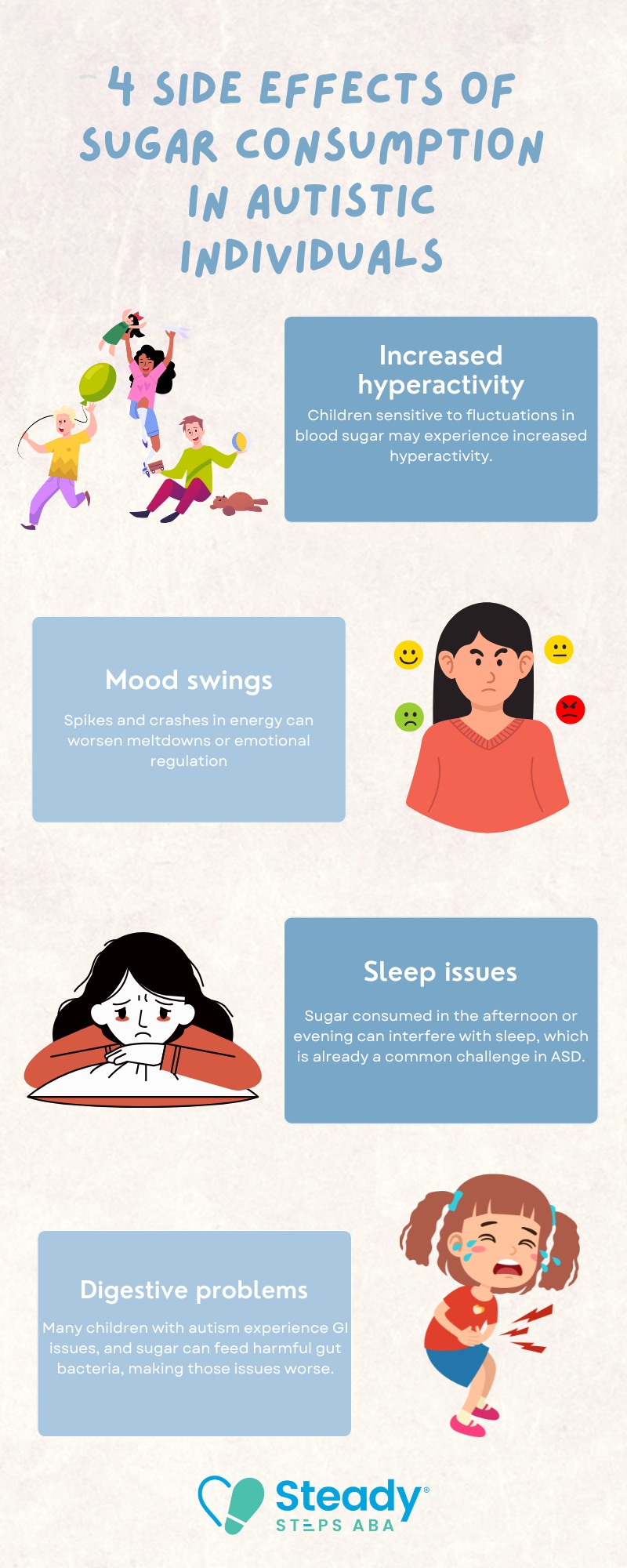Key Points:
- There is no conclusive evidence that sugar causes autism, but some studies explore how sugar may influence behavior or symptoms in autistic individuals.
- High sugar intake may affect behavior, mood, and gut health, which are already areas of sensitivity for many children on the autism spectrum.
- Managing sugar consumption can support overall health and behavioral outcomes, especially when integrated with therapies like ABA.
There is no scientific evidence that sugar causes autism, but high sugar intake may influence certain behaviors or symptoms associated with autism. Sugar can impact mood, attention, hyperactivity, and gastrointestinal issues, a disorder present in at least 46% of autistic individuals.
While autism is a neurodevelopmental condition with genetic and neurological roots, sugar may still play a role in how symptoms manifest on a day-to-day basis. In this article, we’ll dive deep into the link between sugar and autism, how side effects can manifest, and offer some healthier diet options.
Does Sugar Affect Autism?
Yes. While there is no definitive scientific consensus on the direct impact of sugar on autism, some studies suggest that high sugar intake may exacerbate certain behavioral symptoms associated with autism spectrum disorder (ASD). Excessive sugar consumption can lead to blood sugar spikes and crashes, which may influence mood and energy levels, potentially leading to irritability or hyperactivity in some individuals with autism. Additionally, a poor diet high in sugar may contribute to inflammation, which is often linked to various neurological conditions, including ASD. However, more research is needed to fully understand the relationship between sugar and autism.
What Does Research Say About Sugar and Autism?
Autism Spectrum Disorder affects 1 in 31 children in the U.S., according to the CDC. With this rise in diagnoses, parents are paying closer attention to lifestyle factors, including diet. When it comes to sugar and its effect on children with autism, research doesn’t suggest causation, but it does raise valid concerns about behavioral and physical side effects.
Some studies indicate that children with ASD may have a different response to sugar due to metabolic, neurological, or gastrointestinal differences. Other research highlights how sugar may exacerbate symptoms like irritability, hyperactivity, or inattention in sensitive individuals. However, findings vary, and more high-quality, controlled studies are needed.
Exploring the Impact of Sugar on Autism Symptoms
While sugar doesn’t cause autism, it may worsen certain symptoms or make them more noticeable. Children with ASD often struggle with sensory processing, mood regulation, and focus. Since sugar affects blood glucose and brain chemistry, it can amplify existing challenges.
Sugar may contribute to:

These effects are not unique to children with autism, but they can be more disruptive due to the underlying sensory and regulatory challenges that accompany ASD.
The Impact of Sugar on Behavior in Children with Autism
Behavioral challenges are among the most stressful parts of parenting a child on the spectrum. That’s why dietary habits are often scrutinized, especially regarding sugar. While not every child with autism will react negatively to sugar, some may show noticeable changes in mood, attention, or energy levels after consuming sweets.
Children with autism often have atypical brain chemistry, which means they may react differently to common dietary substances. Sugar, especially in the form of simple carbohydrates or artificial sweeteners, can lead to:
1. Emotional Dysregulation
Consuming sugar, especially in simple carbs or artificial sweeteners, can lead to mood swings or heightened emotional reactions. These fluctuations make it harder for children to manage their emotions and behavior, especially if they’re sensitive to changes in their body.
2. Reduced Attention Span
A sugar spike followed by a crash can cause a decrease in focus and concentration. Children may find it harder to stay on task or participate in activities when their energy levels dip after a sugar high.
3. Heightened Sensory Sensitivity
Sugar can increase sensory sensitivity, making noises, textures, and lights feel more overwhelming. This heightened sensitivity can lead to overstimulation, causing stress and discomfort in everyday environments.
4. Increased Repetitive Behaviors
After sugar consumption, some children may exhibit more repetitive behaviors, like hand-flapping or rocking. These behaviors can be a way to self-soothe or cope with the emotional and physical effects of sugar intake.
Behavioral responses to sugar may vary depending on the individual’s metabolic and neurological makeup, but patterns do emerge in some children.
How Diet Affects Children with Autism
Children with ASD frequently have restricted diets, food sensitivities, or selective eating habits. That means every calorie they consume matters more. When sugar displaces more nutritious food, it can lead to nutrient deficiencies that affect brain function, behavior, and development.
Important reasons to monitor sugar intake in autism include:
1. Nutrient Competition
A diet high in sugar often means fewer opportunities to consume nutrient-dense foods like fruits, vegetables, and whole grains. This imbalance can result in deficiencies in vitamins, minerals, and fiber that are essential for growth and development.
2. Immune System Impact
Excessive sugar intake can promote inflammation, which is particularly concerning for children with ASD, who may already face immune system challenges. Chronic inflammation can contribute to a variety of health issues, including digestive problems and skin conditions.
3. Sensory Overload
Sugar highs can lead to overstimulation, amplifying sensory sensitivities and making it harder for children to regulate their reactions. This heightened state can lead to meltdowns or difficulties with everyday activities due to the intense sensory input.
Even naturally occurring sugars like those in fruit juice can have a strong impact, especially when not balanced with proteins, fats, or fiber.
It’s important to recognize that understanding picky eating in adults with autism goes beyond just the foods they prefer. For instance, even naturally occurring sugars, like those found in fruit juice, can have a significant impact on overall health, particularly when not paired with proteins, fats, or fiber. If you’re looking to dive deeper into how picky eating affects individuals with autism, our article, Understanding Picky Eating in Adults with Autism, explores this topic in detail.
5 Types of Sugar to Avoid for Better Autism Management
Not all sugars are equal. Refined sugars and high-fructose corn syrup tend to have the most pronounced effects, while natural sugars in whole foods come with fiber and nutrients that slow absorption.
Sugars to limit or avoid include:
- Refined white sugar
- High-fructose corn syrup (HFCS)
- Artificial sweeteners (e.g., aspartame, saccharin)
- Sugary beverages (soda, energy drinks, juice cocktails)
- Processed snacks (candy, pastries, sugary cereals)
While cutting sugar entirely isn’t necessary for most children, it’s worth being mindful of the type and timing of sugar consumption. Keep in mind that sugar is hidden in many packaged foods under names like maltose, dextrose, or rice syrup.
4 Healthier Alternatives to Sugar for Children With Autism
Children with autism often thrive on structure, and that includes dietary routines. Swapping high-sugar foods with healthier alternatives doesn’t have to be restrictive—it can be a way to introduce more variety and nutrition.
Healthier alternatives to common sugary foods:
1. Fruit Instead of Candy
Swap out sugary candies for naturally sweet fruits like berries, apple slices, or frozen bananas. These options are rich in vitamins, fiber, and antioxidants, making them a healthier and satisfying alternative.
2. Yogurt with Natural Sweeteners
Opt for plain yogurt and add a small amount of honey or maple syrup for sweetness instead of artificially flavored varieties. This way, your child can enjoy a creamy, nutritious snack without the added chemicals or excessive sugar.
3. Homemade Snacks
Make homemade treats like oatmeal cookies with dates or nut butter energy bites. These snacks can be customized to avoid excess sugar while providing protein, healthy fats, and fiber.
4. Smoothies
Blend unsweetened almond milk, spinach, and fruit for a naturally sweet, nutritious smoothie. Smoothies are an easy way to pack in essential nutrients while satisfying a sweet tooth without processed sugars.
These options still offer sweetness but in a slower-digesting and more nutrient-dense form.
5 Effective Strategies for Parents to Manage Sugar Intake
Reducing sugar doesn’t have to feel like a punishment. Small changes can make a big difference, especially when done consistently and with empathy for sensory needs. Children with autism may resist new foods due to texture or color, so patience is essential.
Tips for reducing sugar in a manageable way include:
1. Introduce New Foods Slowly
Gradually introduce new foods to avoid overwhelming your child and help them build familiarity. Starting with small portions or presenting them alongside familiar favorites can make the transition easier.
2. Involve Your Child in Food Prep
Letting your child help with meal preparation can increase their interest in trying new foods. It also empowers them to feel more in control and excited about what they’re eating.
3. Read Labels Together to Spot Hidden Sugars
Reading food labels together helps teach your child about hidden sugars in packaged products. This process can foster independence and raise awareness about healthier food choices.
4. Set Routines with Meals and Snacks
Creating a consistent meal and snack routine can help reduce anxiety around eating. Predictable times for meals and snacks make it easier for your child to anticipate when food is coming.
5. Reward with Non-Food Incentives
Instead of using food as a reward, offer non-food incentives like stickers or extra playtime. This encourages positive behavior while avoiding reinforcing emotional connections with food.
The goal isn’t perfection but progress. Creating a food environment where healthier choices are the norm can help reinforce positive behavior patterns over time.
Should Sugar Be Eliminated Entirely From an Autism Diet?
Eliminating all sugar isn’t necessary for most children with autism, and doing so might increase food rigidity or stress. Instead, aim for balance. Moderation allows your child to participate in social activities (like birthday parties) without food becoming a source of conflict or exclusion.
If your child has severe behavioral reactions to sugar, you might work with a nutritionist or your child’s ABA therapy team to develop a personalized food plan. In some cases, a structured approach like a low-sugar or low-glycemic diet can help with symptom management, but it’s not one-size-fits-all.
Help Your Child Thrive with Customized ABA Therapy Plans
If you’re noticing your child’s behavior shifts after consuming sugar, or you just want extra support in managing routines and dietary habits, Steady Steps ABA can help. Our experienced team offers ABA therapy in Maryland, designed to support children with autism in achieving greater independence, communication, and behavioral regulation.
Whether it’s food-related challenges, emotional outbursts, or skill-building, ABA therapy offers structured, evidence-based support that can make a real difference in your child’s life—and your family’s peace of mind.
Contact us today to learn more about ABA therapy in Maryland and how we can help you support your child’s development, both at home and in the community.






